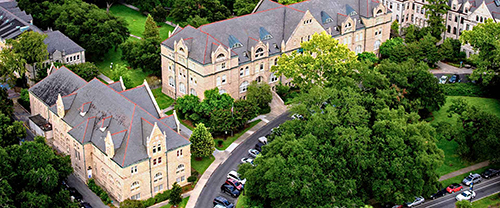
(via tulane.edu)
By Julia Prager-Hessel, guest columnist
Students, faculty, and staff at Tulane received an email last Wednesday that said classes will cease or go online, and those living on campus are to leave in the next week and a half.
However fracturing to our semesters, this move came as no surprise and with little resentment from students. Tulane is largely a flight school that draws many of its students from Los Angeles, New York and Chicago, and our friends at schools across the country had been sent home throughout the week.
There is also a sense of gratefulness on campus — our university is offering emergency housing and food, and most of us have the opportunity to go home if it becomes suddenly necessary. Students recognize that we are in a beautiful city that is not being hit as hard as many other metropolises in the United States — metropolises that many Tulanians come from. And if we are to be trapped anywhere, what better place than New Orleans?
Despite the many warnings and the widespread appreciation for our situations, students are not socially distancing the way university and government officials are telling us to.
The trio of bars on Maple Street were open until Monday, and almost every Snapchat story features students at the Drifter or Ace Hotel pools. There seems to be a desperate attempt to get our last licks of New Orleans before we think about flying home, or an impending travel ban forces us to go.
Telling people to stay away from each other in times of fear or anxiety not only goes against the human instinct to connect, but it is also counter to how college students exist. The bedrock of the Tulane sense of community is the social scene, be it downtown, at Bruno’s or in each others’ backyards.
The promise of a sunny city bustling with culture is what attracted us to this school in the first place. When hundreds of students in their early 20s are left to themselves while their parents hoard toilet paper hundreds to thousands of miles away, the odds of succumbing to house parties or final visits to New Orleans restaurants are high.
The unwillingness to social distance or self-quarantine may be because of our desperation to say goodbye to friends, especially those in their last year, and to New Orleans. It also may be because we are simply not trained to do it.
Many students from New Orleans grew up in the wake of Katrina, just as I and other students from New York grew up in a post-9/11 city. In the face of these tragedies, and the others that students across the country have encountered, we have been taught to come together and to rally in the face of adversity by leaning on each other. Though the age of technology makes this possible by Skype or Zoom – we even have classes online – it does not make it probable or appealing.
When the freshmen and sophomores who live on campus leave, the main source of anxiety among upperclassmen will be deciding whether to stay or go. There are fewer cases of the virus in New Orleans than in more Northern cities, and the city has not completely shut down as other places have; grocery stores, drive-through restaurants and retail stores are still open here. Being stuck inside with our parents after spending three to four years living on our own is daunting, especially when the alternative is being stuck in the sunshine with our best friends.
Practically speaking, college students on the whole are far less vulnerable to the mortality rates of the virus; if we interact exclusively within our age group of 18- to 24-year-olds and unknowingly infect our friends, the symptoms will likely not be as severe as if we infect our parents and grandparents at home.
In reality, though, there is a natural inclination to be with our families when panic sets in, even if that means going to Seattle or San Francisco, where it feels like you can get coronavirus just by walking down the street, or traveling through an airport, which public health officials everywhere say are the hotbeds for the virus.
Regardless of the disruption to our education and possibly our time in New Orleans, students must maintain their appreciation and increase their adherence to social distancing policies. The landscape is changing quickly – just a week ago, we were in class and at work, getting CNN notifications about how the virus was spreading in Seattle – but we must adapt with it.
Tulane places an emphasis on public service, and however seriously the student body may or may not take this mission to serve during the normal school year, we must do what we can to isolate ourselves and share our resources with those at risk.
We must socially distance so that we may come back together sooner, and act in our best interest as well as in others’. It is our responsibility to our friends, to Tulane, and to the city we have all grown to love so dearly.
Julia Prager-Hessel is a junior at Tulane studying English, history and philosophy.